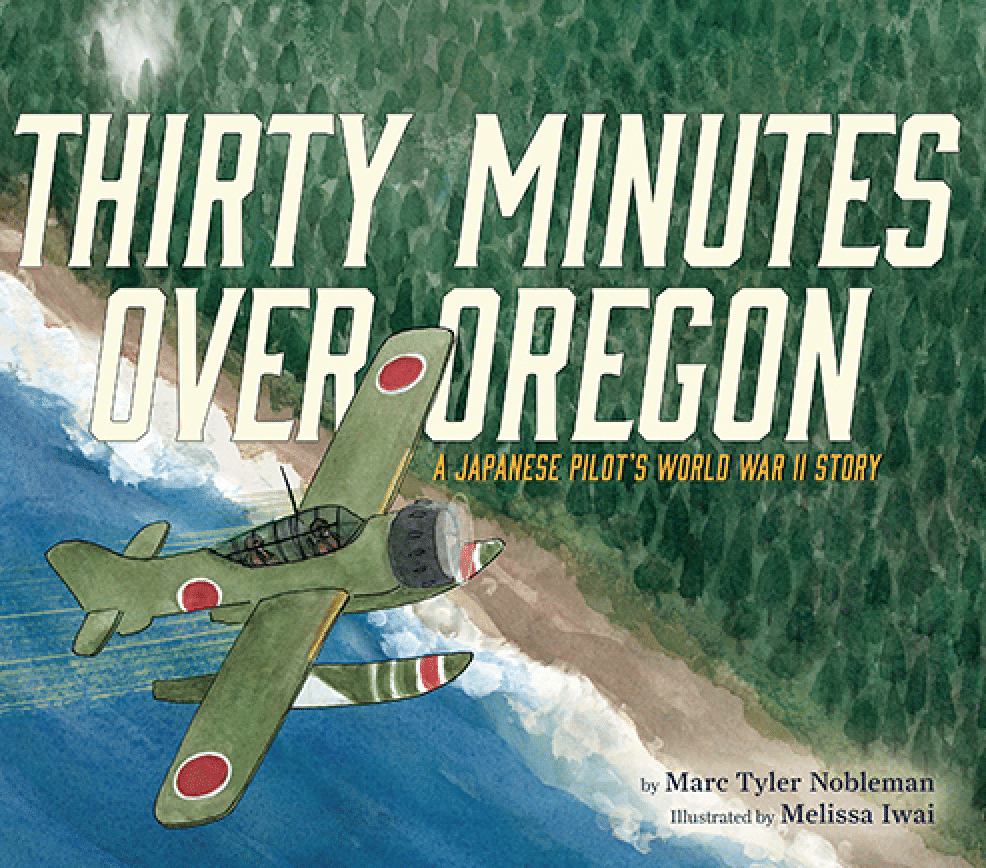
Thirty Minutes Over Oregon: A Japanese Pilot’s World War II Story
- Non-fiction
- Set in U.S.
Keywords: war, friendship, peace
The devastating attack on Pearl Harbor, Hawaii, drew the United States into World War II in 1941. But few are aware that several months later, the Japanese pilot Nobuo Fujita dropped bombs in the woods outside a small town in coastal Oregon. This is the story of those bombings, and what came after, when Fujita returned to Oregon twenty years later, this time to apologize.
Marc Tyler Nobleman’s Thirty Minutes Over Oregon tells the story of Nobuo Fujita (pronounced: no-BOO-oh FOO-jee-tah), a Japanese pilot during World War II, and his journey toward reconciliation with his former enemies. Fujita was ordered to fly a secret mission from a submarine to bomb the forests of Oregon, but his exploits resulted in little to no damage. Although the city of Brookings, Oregon, where the bombs were dropped, was shaken, the event was barely reported in the rest of the country.
Regardless, Fujita’s two bombings of Brookings haunted him long after the war ended. Then, in a bold move toward reconciliation, the Brookings Jaycees invited Fujita to be the guest of honor at their 1962 Memorial Day parade. Fujita accepted. Although the invitation caused a backlash among some residents of Brookings, Fujita nevertheless made the journey back to Oregon, where he was ultimately greeted with warmth.
Fujita’s visit was the beginning of a long relationship with the community. Twenty-three years after the parade, Fujita hosted several people from Brookings in Japan. A representative from Brookings visited Fujita in Japan as he was dying, and some of Fujita’s ashes were scattered at the site of his bombings in the Oregon forest. The courage and resolve displayed by both Fujita and the community of Brookings to come together after conflict serves as an example to all.
Historical Background
On December 7, 1941, Japan bombed Pearl Harbor, an American naval base in Honolulu. Thousands of American soldiers were killed, and as a result, the United States officially joined World War II in the Pacific. The United States conducted the “Doolittle Raid,” a comparably small air raid off Tokyo in April 1942, just four months after Pearl Harbor. While the damage to Japan was relatively minor—fifty people were killed—it served as a morale booster for the Allies and a demonstration to Japan that its main islands weren’t safe from air attack. Following the raid, Japan set out to show that the United States could also be bombed.
The mission flown by Fujita to bomb the forests of Oregon in September 1942 did indeed prove that continental America was not completely safe, yet it had little overall impact. The U.S. military saw the “Lookout Air Raid” as an isolated incident and made little effort to fortify the coast. The fact that the plane took off from a submarine was also dismissed. The second Japanese bombing of Oregon had even less impact—neither of the bombs detonated. In spite of this, Japan claimed both bombings as victories.
While the Lookout Air Raid was the first time the contiguous United States was attacked by the Axis powers, it was not the first attack on the continental United States. In June 1942, Japan launched two raids on the Dutch Harbor Naval Base in Alaska. Known as the Battle of Dutch Harbor, this attack was the opening move in the Japanese effort to occupy the Aleutian Islands. Ultimately, forty-three Americans and ten Japanese were killed, and Japan occupied two of the islands until July 1943.
Fujita’s bombing of Oregon became the second attack on the continental United States and remains one of only a handful of attacks that have occurred on U.S. soil. In spite of the small number of attacks and their general lack of success, fears surfaced of a full-scale invasion of the West Coast by the Japanese, yet it never came to pass.
Pronunciation Guide
Ayako, pronounced: AH-yah-koh
Yoshi, pronounced: YO-shee
Yoriko, pronounced: YO-ree-koh
Hiroshima, pronounced: hee-ROW-SHEE-MAH
Nagasaki, pronounced: nah-GAH-sah-key
Seppuku, pronounced: seh-POO-KU
Author: Evelyn Seitz, researcher and translator
2024
Fill our the online form to access the NCTA webinar “Thirty Minutes Over Oregon: A Japanese Pilot’s World War II Story,” with author Marc Tyler Nobleman
